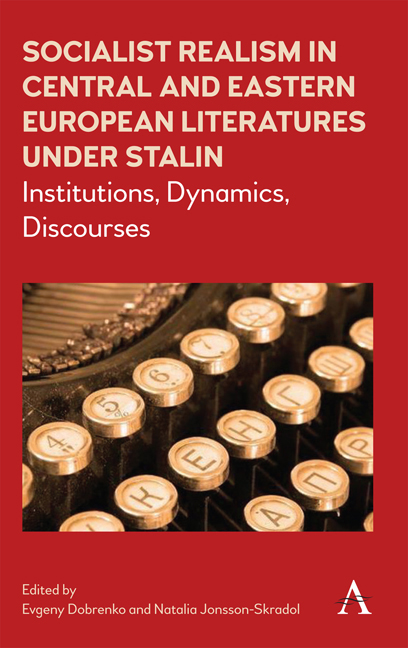 Socialist Realism in Central and Eastern European Literatures under Stalin
Socialist Realism in Central and Eastern European Literatures under Stalin Introduction
Published online by Cambridge University Press: 10 May 2018
Summary
Soviet cultural policy in Eastern Europe after World War II has been the topic of many articles, monographs and dissertations since the initial post- war years. The growth or decline of interest in the subject has often been determined by the political and social context of a specific moment, with the research focus shifting accordingly. The novelty of the theme and the extent of transformations in the European political and cultural sphere spurred the earliest studies, in which researchers focused on ‘the scope and scale of oppression and uniformity behind the “Iron Curtain,” as did later scholars working on the immediate postwar decade’. As new academic disciplines (behaviourism, the study of cultures at a distance) and research institutions emerged at the beginning of the Cold War, scholars’ concern with literature involved reading literary texts only insofar as experts were searching for reliable information on everyday life behind the Iron Curtain. The loosening of restrictions on travel around 1956 brought with it more direct contacts and thus more focused scholarly attention to cultural policies as possible harbingers of political changes, but the general paradigm of research remained in place, the assumption being that Soviet ideology governed Soviet institutions, and the institutions were then replicated in the new satellites so that they, in their turn, could replicate and propagate the new ideology.
The next wave of interest in the subject came with the collapse of the system and the opening of the Soviet archives in the early 1990s. Still, the basic Sovietological premise proved to be the basis of much of the later research, even if some of the interpretations sought to go against the hitherto unanimously accepted premise of external imposition and internal (more or less forced) compliance. As an author recently noted, ‘The principal interpretative themes of this [S] ovietization historiography have developed around two closely- related problems. The first can be summarized under the heading of uniformity versus diversity, the second under the title of outside imposition versus indigenous development’. The underlying premise behind this volume is that a new research paradigm is called for. What if it is not uniformity versus diversity, or imposition versus indigenous development, but both the one and the other? What if the four practices were equally indispensable for the functioning of the system – at least for as long as it kept functioning?
- Type
- Chapter
- Information
- Socialist Realism in Central and Eastern European Literatures under StalinInstitutions, Dynamics, Discourses, pp. 1 - 14Publisher: Anthem PressPrint publication year: 2018


